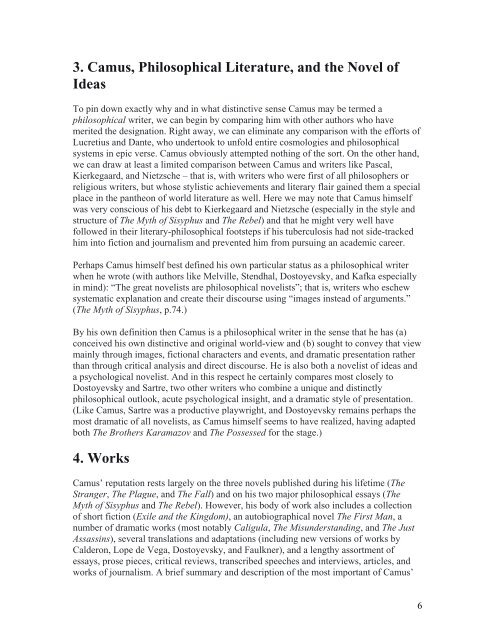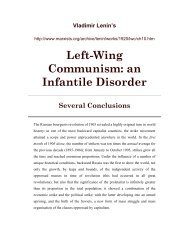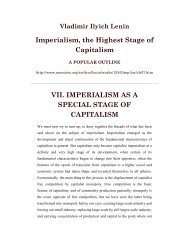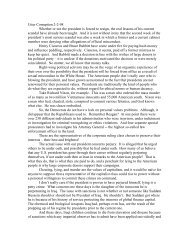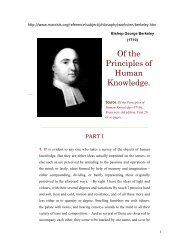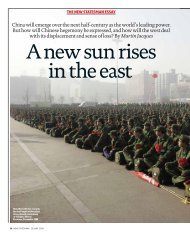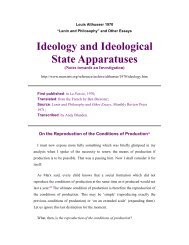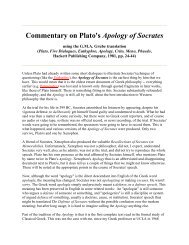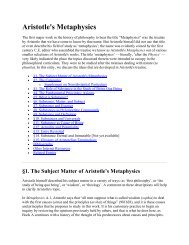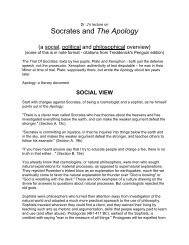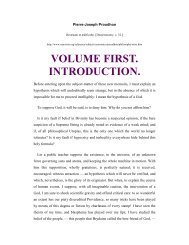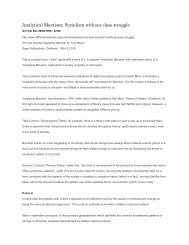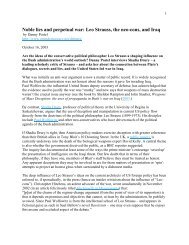Albert Camus (1913â1960) - Richard Curtis
Albert Camus (1913â1960) - Richard Curtis
Albert Camus (1913â1960) - Richard Curtis
Create successful ePaper yourself
Turn your PDF publications into a flip-book with our unique Google optimized e-Paper software.
3. <strong>Camus</strong>, Philosophical Literature, and the Novel of<br />
Ideas<br />
To pin down exactly why and in what distinctive sense <strong>Camus</strong> may be termed a<br />
philosophical writer, we can begin by comparing him with other authors who have<br />
merited the designation. Right away, we can eliminate any comparison with the efforts of<br />
Lucretius and Dante, who undertook to unfold entire cosmologies and philosophical<br />
systems in epic verse. <strong>Camus</strong> obviously attempted nothing of the sort. On the other hand,<br />
we can draw at least a limited comparison between <strong>Camus</strong> and writers like Pascal,<br />
Kierkegaard, and Nietzsche – that is, with writers who were first of all philosophers or<br />
religious writers, but whose stylistic achievements and literary flair gained them a special<br />
place in the pantheon of world literature as well. Here we may note that <strong>Camus</strong> himself<br />
was very conscious of his debt to Kierkegaard and Nietzsche (especially in the style and<br />
structure of The Myth of Sisyphus and The Rebel) and that he might very well have<br />
followed in their literary-philosophical footsteps if his tuberculosis had not side-tracked<br />
him into fiction and journalism and prevented him from pursuing an academic career.<br />
Perhaps <strong>Camus</strong> himself best defined his own particular status as a philosophical writer<br />
when he wrote (with authors like Melville, Stendhal, Dostoyevsky, and Kafka especially<br />
in mind): “The great novelists are philosophical novelists”; that is, writers who eschew<br />
systematic explanation and create their discourse using “images instead of arguments.”<br />
(The Myth of Sisyphus, p.74.)<br />
By his own definition then <strong>Camus</strong> is a philosophical writer in the sense that he has (a)<br />
conceived his own distinctive and original world-view and (b) sought to convey that view<br />
mainly through images, fictional characters and events, and dramatic presentation rather<br />
than through critical analysis and direct discourse. He is also both a novelist of ideas and<br />
a psychological novelist. And in this respect he certainly compares most closely to<br />
Dostoyevsky and Sartre, two other writers who combine a unique and distinctly<br />
philosophical outlook, acute psychological insight, and a dramatic style of presentation.<br />
(Like <strong>Camus</strong>, Sartre was a productive playwright, and Dostoyevsky remains perhaps the<br />
most dramatic of all novelists, as <strong>Camus</strong> himself seems to have realized, having adapted<br />
both The Brothers Karamazov and The Possessed for the stage.)<br />
4. Works<br />
<strong>Camus</strong>’ reputation rests largely on the three novels published during his lifetime (The<br />
Stranger, The Plague, and The Fall) and on his two major philosophical essays (The<br />
Myth of Sisyphus and The Rebel). However, his body of work also includes a collection<br />
of short fiction (Exile and the Kingdom), an autobiographical novel The First Man, a<br />
number of dramatic works (most notably Caligula, The Misunderstanding, and The Just<br />
Assassins), several translations and adaptations (including new versions of works by<br />
Calderon, Lope de Vega, Dostoyevsky, and Faulkner), and a lengthy assortment of<br />
essays, prose pieces, critical reviews, transcribed speeches and interviews, articles, and<br />
works of journalism. A brief summary and description of the most important of <strong>Camus</strong>’<br />
6


